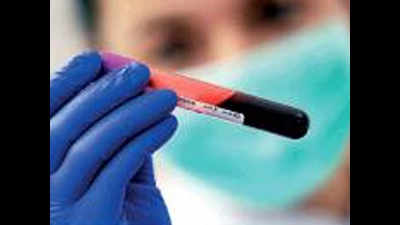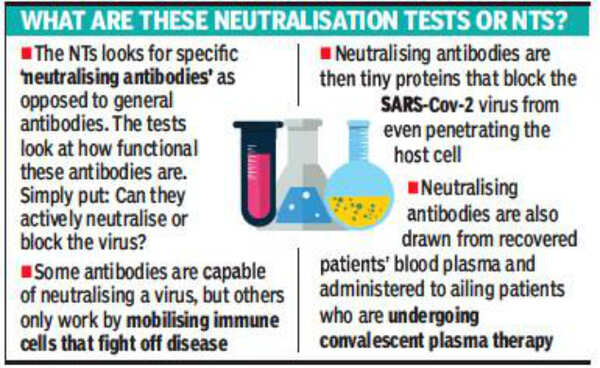Trending
This story is from June 2, 2020
Pune: NIV develops neutralisation blood test to detect immunity after Covid-19 infection
Scientists at the Pune-based Indian Council of Medical Research-National Institute of Virology (ICMR-NIV) have developed a first-of-its-kind virus neutralisation assay, a blood test to detect neutralising antibodies (NAbs) in the body after a Covid-19 infection.

Representative image
PUNE: Scientists at the Pune-based Indian Council of Medical Research-National Institute of Virology (ICMR-NIV) have developed a first-of-its-kind virus neutralisation assay, a blood test to detect neutralising antibodies (NAbs) in the body after a Covid-19 infection.

The announcement comes weeks after the ICMR-NIV unveiled its ELISA-based blood antibody (IgG) test that tracks the extent of spread in a population.But unlike the ELISA test, which determines if a person has had the infection, the neutralisation test can prove if a person has developed some post-exposure protective immunity against the virus.

“The neutralisation test (NT) will be extremely useful to determine how widely a population has gained protective immunity against SARS-CoV-2. It will also be extremely useful in assessing the efficacy of a vaccine in generating protective antibodies,” ICMR-NIV director Priya Abraham told TOI.
The NIV’s earlier virus-tracking tool, the ELISA-based blood test, picks up the immunoglobulin G (IgG) antibody within seven days of exposure. The new neutralisation test detects neutralising antibodies two weeks after infection or exposure to the virus.
A patient who has recovered from Covid-19 will have these neutralising antibodies. But it’s still not clear how long they last in the blood.
“The neutralisation test is regarded as the gold standard to assess protective immunity. Research is underway to assess how long these neutralising antibodies last in human blood,” Abraham said.
Gajanan Sapkal, an ICMR-NIV scientist who helped developed the neutralisation test, said: “Neutralising antibodies are specific antibodies found in the serum of Covid-19 patients. These antibodies are responsible for clearing the viral infection. The assay, or test, is capable of measuring these antibodies that lend us protective immunity.”
Measuring these neutralising antibodies requires a live virus, highly-skilled operators and a level-3 biosafety facility. Not all labs then can carry out the neutralisation test (NT).
“Our IgG ELISA test uses an inactivated viral antigen, which shows presence or absence of antibody. In the neutralisation test, we use a live virus to determine concentration of neutralising antibodies (expressed in titer) in an exposed person's blood sample,” Sapkal said.
The IgG antibody test, which looks for history of infection, provides experts a sense of how much Covid-19 has spread in a community.
“But what we must also try to know is the presence of neutralising antibodies that lend real protection against the virus. The NT test can work as one of the keys to the lockdown exit,” said senior epidemiologist Amitav Banerjee.

The announcement comes weeks after the ICMR-NIV unveiled its ELISA-based blood antibody (IgG) test that tracks the extent of spread in a population.But unlike the ELISA test, which determines if a person has had the infection, the neutralisation test can prove if a person has developed some post-exposure protective immunity against the virus.

Essentially, the test can help city administrations pick people who can safely return to work and resume routine activities.
“The neutralisation test (NT) will be extremely useful to determine how widely a population has gained protective immunity against SARS-CoV-2. It will also be extremely useful in assessing the efficacy of a vaccine in generating protective antibodies,” ICMR-NIV director Priya Abraham told TOI.
The NIV’s earlier virus-tracking tool, the ELISA-based blood test, picks up the immunoglobulin G (IgG) antibody within seven days of exposure. The new neutralisation test detects neutralising antibodies two weeks after infection or exposure to the virus.
A patient who has recovered from Covid-19 will have these neutralising antibodies. But it’s still not clear how long they last in the blood.
“The neutralisation test is regarded as the gold standard to assess protective immunity. Research is underway to assess how long these neutralising antibodies last in human blood,” Abraham said.
Gajanan Sapkal, an ICMR-NIV scientist who helped developed the neutralisation test, said: “Neutralising antibodies are specific antibodies found in the serum of Covid-19 patients. These antibodies are responsible for clearing the viral infection. The assay, or test, is capable of measuring these antibodies that lend us protective immunity.”
Measuring these neutralising antibodies requires a live virus, highly-skilled operators and a level-3 biosafety facility. Not all labs then can carry out the neutralisation test (NT).
“Our IgG ELISA test uses an inactivated viral antigen, which shows presence or absence of antibody. In the neutralisation test, we use a live virus to determine concentration of neutralising antibodies (expressed in titer) in an exposed person's blood sample,” Sapkal said.
The IgG antibody test, which looks for history of infection, provides experts a sense of how much Covid-19 has spread in a community.
“But what we must also try to know is the presence of neutralising antibodies that lend real protection against the virus. The NT test can work as one of the keys to the lockdown exit,” said senior epidemiologist Amitav Banerjee.
End of Article
FOLLOW US ON SOCIAL MEDIA










